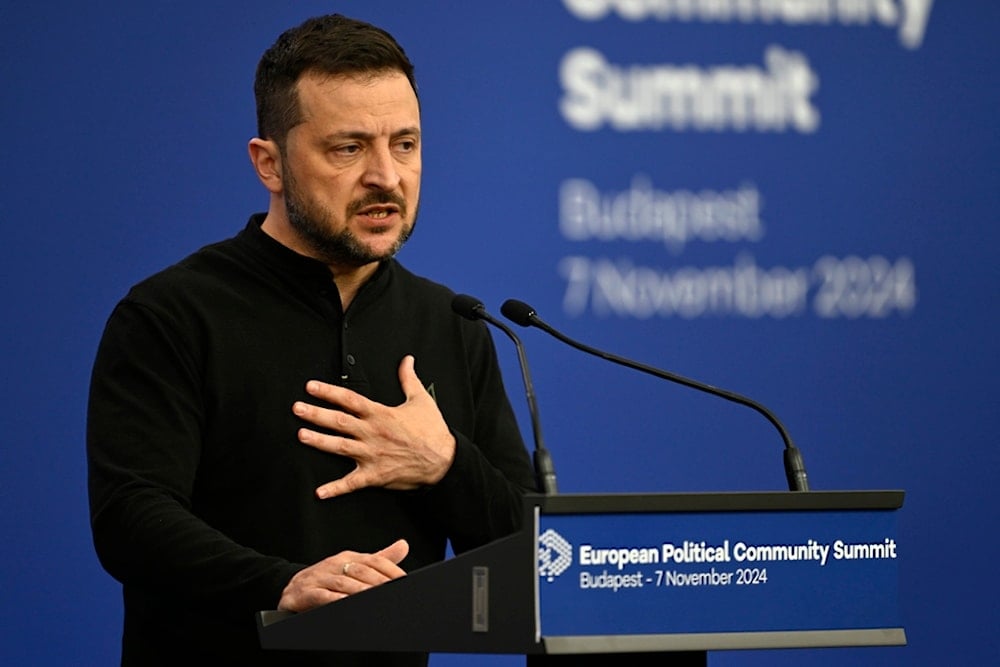The West is silencing calls for diplomacy in Ukraine: Analysis
Eldar Mamedov argues that the dominant narrative in the West has led to the marginalization of scholars, analysts, and policymakers who had warned about the risks of the conflict and urged for pragmatic engagement.
-

Ukrainian President Volodymyr Zelensky speaks during a press conference during the European Political Community (EPC) Summit at the Puskas Arena in Budapest, Hungary, Nov. 7, 2024. (AP)
An analysis published by writer Eldar Mamedov for Responsible Statecraft on Friday sheds light on a troubling trend: the erosion of democratic debate in the West amid the ongoing war in Ukraine.
Framing the conflict as a global struggle between democracies and autocracies, politicians and commentators across Europe and America have suppressed critical perspectives and silenced voices advocating for diplomatic solutions.
Mamedov argues that the dominant narrative in the West has led to the marginalization of scholars, analysts, and policymakers who had warned about the risks of the conflict and urged for pragmatic engagement.
Instead, these voices have been vilified, labeled as Kremlin sympathizers, and pushed to the fringes of foreign policy discourse.
Stifled discourse in Europe
Europe, Mamedov notes, has been particularly resistant to alternative perspectives. He highlights Sweden's swift decision to join NATO without robust public debate as an example of democratic shortcomings.
Swedish international relations scholar Frida Stranne, who questioned the necessity of abandoning neutrality, faced intense backlash, being branded a "Putinist" for her views.
Read more: New German leftist party urges Russia talks to end Ukraine war
Germany, once known for its Ostpolitik—pragmatic engagement with Russia—has also silenced dissenting voices. Johannes Varwick, a prominent foreign policy expert, warned of the dangers of NATO expansion and called for negotiations to address Russia's security concerns.
Despite condemning Russia's invasion as illegal, his calls for diplomacy led to severed ties with political institutions and accusations of serving Russian interests.
Missed opportunities for diplomacy
Mamedov highlights a critical moment in early 2022 when Ukraine and Russia reportedly came close to a negotiated settlement.
The proposed deal included Ukraine's neutrality, security guarantees, and conditional sanctions relief for Russia. However, these efforts were undermined by Western leaders, including then-British Prime Minister Boris Johnson, who encouraged Ukraine to pursue military solutions.
This decision, Mamedov argues, has prolonged the war and placed Ukraine in an increasingly precarious position.
Today, with territorial losses mounting, Ukrainian President Volodymyr Zelensky is signaling a willingness to revisit compromises that were once dismissed.
Read more: Zelensky proposes forfeit of eastern territories for NATO bid
Shifting public opinion
While hawkish voices continue to dominate policy circles, public sentiment in the West is shifting. Surveys show a majority of Europeans favor negotiations over continued military escalation.
Anti-war movements are gaining traction, with figures like Donald Trump and emerging parties in Germany and France advocating for an end to the conflict through diplomacy.
Mamedov concludes with a sobering reminder: irrespective of the war's outcome, the West and Russia will need to establish a modus vivendi to prevent further escalation.
He urged policymakers to restore open democratic debates and to listen to experts who had the foresight to predict the current quagmire.

 3 Min Read
3 Min Read









